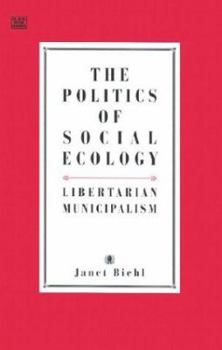Politics of Social Ecology
Select Format
Select Condition 
Book Overview
Since his youth in the 1930s, Murray Bookchin has devoted his life to looking for ways to replace today's authoritarian society, and the system that immiserates most of humanity and poisons the... This description may be from another edition of this product.
Format:Paperback
Language:English
ISBN:1551641003
ISBN13:9781551641003
Release Date:October 1997
Publisher:Black Rose Books
Length:204 Pages
Weight:0.56 lbs.
Dimensions:0.4" x 5.3" x 8.3"
Customer Reviews
4 ratings
An excellent introduction to social ecology
Published by Thriftbooks.com User , 17 years ago
In brief, engaging, easy-to-read essays, Janet Biehl explains Murray Bookchin's theory of libertarian municipalism and social ecology. For those of you who don't already know, Bookchin, a long-time environmental and labor radical, has played a key role in bringing together ecological and social justice campaigns. Quite correctly, Bookchin argues that a rational, liberatory society would have to be pro-feminist, anti-capitalist, anti-racist and green. In short, social ecology is an intelligent response to the misanthropy, homophobia, racism, classism, sexism and new age navel-gazing unfortunately advocated by far too many deep ecology activists. Moreover, this volume concludes with an insightful discussion between Biehl and Bookchin, a meeting of two great minds.
A Biehl on Bookchin
Published by Thriftbooks.com User , 24 years ago
In "The Politics of Social Ecology: Libertarian Municipalism" Janet Biehl does an excellent job elaborating upon and solidifying the ideas, steps and political procedures stemming from Murray Bookchin's red-green philosophy. Concise, to the point, and thought provoking for any reader curious towards politics and the human order.
An excellent primer into the world of radical politics.
Published by Thriftbooks.com User , 24 years ago
The Politics of Social Ecology: Libertarian Municipalism by Janet Biehl. Biehl's previous work looked at the convergence of ecological and feminist thinking 'Rethinking Ecofeminism'. Here she addresses the politics of social ecology, a radical critique of existing society pioneered and developed by political philosopher Murray Bookchin. This is then, a primer on Bookchin's thinking, an essential opening to Social Ecology. The stress here is on the political, rather than the social, anthropological or philosophical aspects of Social Ecology. This is no accident. At the heart of Biehl's analysis is the idea that the ecology movement has largely moved away from the political, increasingly moving towards a purely personal and/or spiritual worldview. This, argues Biehl persuasively, results in an insipid reactionary environmentalism. In opposition to this trend she advocates the radicalisation of the ecology movement, making common cause with other areas of exploitation. We must, she argues, understand the forces which undermine our environment, degrade our experiences and commodify our existence. These forces are the free market capitalist economy perpetuated by the nation state. In opposition to these now universal forces which cause such poverty, and human degradation we must build movements of resistance around municipalities. She argues that, whilst the state has been an imposition of an arcane and insane political order, there is a alternative history of free municipalities. Social Ecology demands the overthrow of the capitalist state and the reconstruction of viable socio-ecological relations. It is markedly different from other ecological outlooks in it refuses to buy into a reactionary technophobic analysis, arguing for appropriate technologies and embracing Enlightenment ideals as being essential to human develeopment. Biehl's book addresses the possibilities of a new politics based on direct democracy of municipal assemblies. Such assemblies would be confederated to wider regional groups who would co-ordinate non-local matters. It's an inspiring vision of a different, ecological future, where a general interest is realised and allows human endeavous to flourish. Social Ecology is a powerful tool for the re-contruction of a left-green movement wallowing in confusion, indulging in psychobabble and spiritual hokum and deluded by political compromise. Janet Biehl's book is a brilliant analysis of alternatives to this dead end.
Is there an alternative to the State?
Published by Thriftbooks.com User , 26 years ago
The aim of the book -as expressed during the introduction by its author Janet Biehl- is to divulge the ideas of Murray Bookchin, already published in different books and articles, but sometimes hard to find or to read to the common people. With a short trip through human history, Bookchin shows us that the State has not always existed (and, of course, that it has not to exist for ever). What's more, he maintains that the State as a form of organisation has been an imposition of a part of the people, not a free choice of the majority --and that actual political class tries to keep away the common people from the political arena, converting them just in "voters" and "taxpayers". There has been alternatives to the State, all of them with a main thing in common: its origin in the municipality. From here, Bookchin extracts the main theses of the book: the municipality is the right place --and maybe the unique-- where people can start to radicalise the democracy in order to get direct democracy. The book goes on describing the process libertarian people must follow to get at libertarian municipalities: the way they have to organise, the way they have to take decisions, the way they have to participate in the actual "political" live, the dangers they will have to confront (with an interesting Green's movement analysis), etc.. If some times the book seems too simple, we must arrive to the interview with M. Bookchin. This is the place where many questions appeared through the text find its answer. An essential complement, the interview gives to the book the necessary end. A light in the night!





